Pensioners and savers big winners of Budget 2014
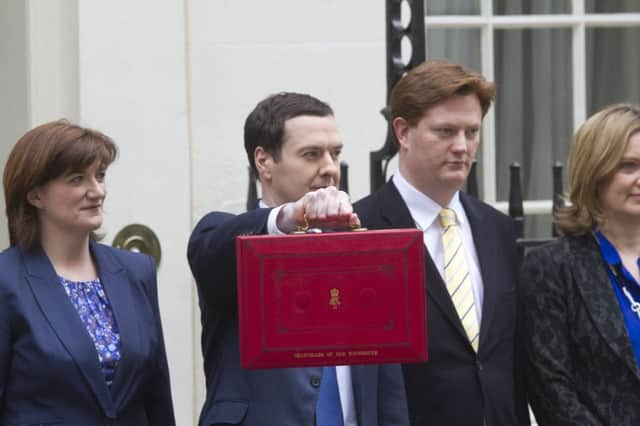

The Chancellor announced radical reforms to tax rules on retirement pots and introduced new flexible Isas that allow people to save up to £15,000 without the Treasury taking a cut.
As predicted, he pushed the personal income tax allowance up to £10,500 from April 2015, from £10,000 in the 2014-15 tax year, but resisted pressure from Conservative backbenchers – including two former chancellors – for a significant increase in the 40p income tax threshold.
Advertisement
Hide AdAdvertisement
Hide AdWith the May 2015 general election firmly in his sights, Mr Osborne promised a Budget for “doers, makers and savers” in his speech.
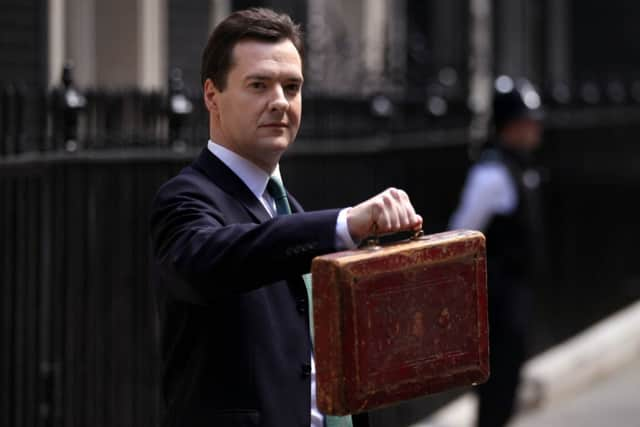

He announced a £119.5 billion cap on overall welfare spending, excluding the state pension and Jobseekers’ Allowance, offered a package of support for manufacturers, and unveiled a £7bn scheme to slash energy bills for businesses.
The Chancellor began his statement with an upbeat economic forecast, including predictions from the Office for Budget Responsibility that the UK economy will grow by 2.7 per cent in 2014 and that the government will be back in surplus by 2018-19.
“The message from this Budget is: you have earned it, you have saved it, and this government is on your side, whether you’re on a low or middle income, whether you’re saving for your home, for your family or your retirement. The forecasts I’ve presented show growth up, jobs up and deficit down.”
But Mr Osborne warned a buoyant economic outlook did not signal the end of austerity. “There will be more hard decisions, more cuts. The question for the British people is who has the credibility to deliver them.”
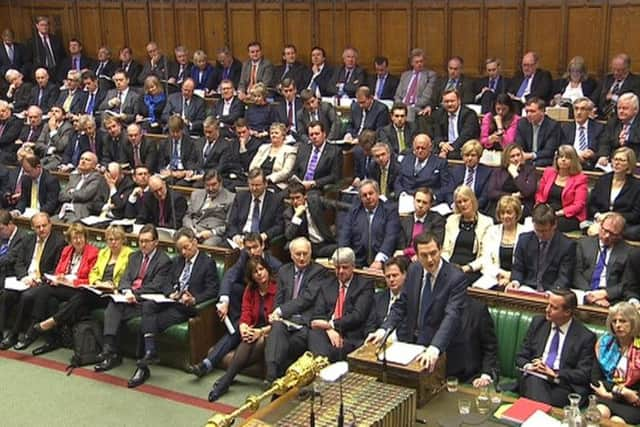

Last night, shadow chancellor Ed Balls said Mr Osborne failed to deliver the spectacular “rabbit out of the hat” many had been expecting. He also claimed the government’s figures showed it would have to borrow £190 million more than planned over the course of this parliament.
John Swinney, Scotland’s finance secretary, said help for pensioners and savers was long overdue, but argued that real incomes were still being squeezed and few families in Scotland would be able to take full advantage of what was on offer.
He said: “With the welfare cap set to include pension credit and savings credit, which currently offer real help to poorer pensioners and will continue in an independent Scotland, the Chancellor’s claims to protect pensioners do not stack up.”
Advertisement
Hide AdAdvertisement
Hide AdThe measures aimed at rewarding pensioners and those about to retire made up the main elements of yesterday’s Budget, a move Mr Osborne said amounted to “the most far-reaching reform to the taxation of pensions since the regime was introduced in 1921”.
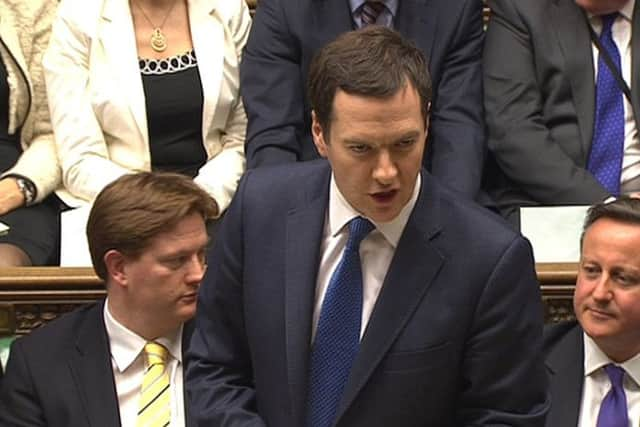

The Chancellor unveiled plans for a new state-backed “pensioner bond” offering higher savings rates than can be found in banks. Up to £10bn of the bonds will be issued, with individuals able to save as much as £10,000 and interest outlined as being 2.8 per cent to 4 per cent.
For those about to retire, Mr Osborne said he would liberalise the private pension market by allowing people to spend the money they have saved however they want, ending the requirement to buy an annuity to provide a regular income.
He noted that there had been concerns about hidden charges and small returns in the annuity market, much of which is based in Edinburgh, and that it is now subject to an investigation from the Financial Services Authority.
Mr Osborne said he would be able to fund his plans in part because the government’s economic plan will bring in an extra £16bn over the next five years.
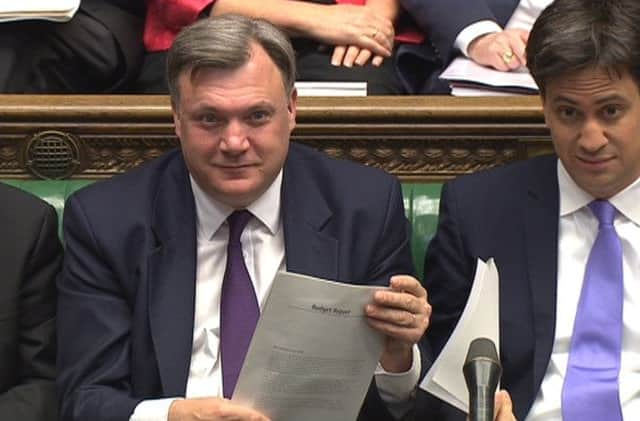

Chris Sanger, head of tax policy at Ernst & Young, said Mr Osborne’s “great granny giveaway” will “make saving for a pension much more attractive”.
But Len McCluskey, general secretary of the Unite trade union, accused the Chancellor of a politically motivated move designed to appeal to “blue rinses, not blue collars”.
The Budget did include some crowd-pleasers, including the end of the duty escalator on whisky, spirits and wine, and 1p off a pint of beer. Tobacco taxes will go up by 2 per cent above inflation, but duty on bingo halls was halved to 10 per cent.
Advertisement
Hide AdAdvertisement
Hide AdInheritance tax will be waived when members of the emergency services die in the line of duty, and cash from Libor-related fines on bankers will be handed out beyond the current military and emergency services’ charities, to include search and rescue, lifeboat organisations, the Scouting movement and St John Ambulance.
The Chancellor raised the level of earnings exempt from income tax to £10,500 from April 2015. And there were cheers from the Tory backbenches over the decision to raise the point where people pay the 40p higher rate from £41,450 to £41,865 this year and £42,285 next year.
Last night, Scottish Secretary Alistair Carmichael said the reforms to private pensions and savings gave the Scottish Government “a real challenge” in the independence debate. He said: “This could only be done because of the stability offered by being part of the UK.”
In his response to the Budget, Labour leader Ed Miliband said that it was evidence the country was “worse off” after four years of Tory-led coalition government. Mr Miliband took aim at the “same old Tories” for giving City bankers who earn £5m a year a £200,000 annual tax cut while freezing pay for thousands of nurses.
He said: “These are the people who have the nerve to tell us, ‘We’re all in this together’. It is Tory values, it is Tory choices, it is same old Tories.”
Donald Fleming, pensions partner at KPMG Scotland, said: “From limited choices, individuals now have greater flexibility to decide how they save for the future, but with more decisions to be made comes more responsibility and greater risk.”
Pensions expert Ros Altmann said the reforms left her “almost speechless”, but she stressed that people would need impartial advice to ensure they made the most of their savings.
The former Saga director-general said: “All defined contribution pensions look set to be freed from the annuity straitjacket that has so disadvantaged people in the past.”
Advertisement
Hide AdAdvertisement
Hide AdBarry O’Dwyer, of Edinburgh-based Standard Life, said the group was “very happy” with the reforms, despite the inevitable impact they will have on sales of annuities, through which people buy a guaranteed income for life with their pension savings.
However, critics said that the measures benefited the better-off and hit the poor.
Nick Pearce, Institute for Public Policy Research director, said that people needed an annual income of at least £125,000 to benefit from the Isa changes.
He said: “The Chancellor is right to try and encourage saving but it would have been far better to focus on low to middle earners, for example through a scheme that matched their savings … rather than to give further tax relief to the better-off.”
SKETCH
Tom Peterkin: History offers rich pickings for trading insults Osborne’s message for the (middle) ages
Never mind the age of austerity, George Osborne seemed more concerned with the Middle Ages when he announced his Budget yesterday.
The Chancellor licked his lips as he announced a grant to help mark next year’s 800th anniversary of Bad King John signing the Magna Carta at the behest of the English nobility.
Indeed, one wondered whether the announcement represented a genuine wish to celebrate the contents of the document, which saw a cruel and greedy king forced to put his name to a document enshrining liberty and justice.
Advertisement
Hide AdAdvertisement
Hide AdWas Osborne’s excursion into the history books simply a chance to have a good joke at Ed Miliband’s expense? “King John’s humbling centuries ago seems unimaginably distant,” said the Chancellor. “A weak leader, who had risen to the top – after betraying his brother, compelled by a gang of unruly barons to sign on the dotted line.”
To the braying Tory benches, John’s “humbling” was easy to imagine. For them the parallels were clear. For Richard the Lionheart read David Miliband, and for unruly medieval barons read the 21st-century trade union barons. Stung at the comparison, Miliband jnr preferred to see himself more as a Robin Hood figure.
Clearly he viewed himself as a man who would take money from the rich to help the poor – albeit one who was more inclined to use the tax system than his bow and arrow. Claiming that Cameron and Osborne could afford a £200,000 tax cut for bankers but were unable give a nurse a £250-a-year pay rise, Miliband must have been tempted to portray them as latter-day Sheriffs of Nottingham.
Instead he fell back on familiar ground. It was the public school old boys’ network rather than legendary skirmishes in Sherwood Forest that was in the Labour leader’s sights as he condemned the “Eton Mess” being made of the economy.
According to the Labour leader, there were now more Etonians writing the Tory manifesto than there were women in the Cabinet.
“No girls allowed,” quipped Miliband, safe in the knowledge that there happens to be a few more female faces in his own band of Merry Men who make up the Shadow Cabinet.
ANALYSIS: PENSIONS
David Bell: Annuities shake-up is to be welcomed
An election is looming. Pensioners are likely to vote. So now seems a good time to make life easier for them. So it’s no surprise George Osborne introduced a raft of changes to pension regulations in yesterday’s Budget.
These are not minor changes – they will fundamentally alter the choices available to pension scheme members when they retire.
Advertisement
Hide AdAdvertisement
Hide AdThe most important change is that members of defined contribution schemes will no longer have to buy an annuity on retirement.
The current regulations force those who have saved regularly into a pension pot to buy an annuity, which will provide them with a regular income for the rest of their lives.
The new regulations will allow those who have reached the point of retirement to withdraw as much as they like from their pot as a lump sum.
Any remaining cash can be invested in whatever way they choose. And the tax rate payable on withdrawals will be reduced.
These changes are likely to be welcomed by pensioners because of the added flexibility they give.
In addition, the government has committed to give anyone retiring from April 2015 onward free, impartial face-to-face investment advice.
The added flexibility
brought about by these changes might induce members of defined benefits schemes, many of whom are in the public sector, to consider moving to defined contribution schemes.
However, because the costs of such scheme switches might fall on the taxpayer, the government intends to introduce legislation to prevent this happening.
Advertisement
Hide AdAdvertisement
Hide AdIt is also unlikely to support such switches for private sector defined benefit schemes.
The UK annuity market has been heavily criticised as offering poor value for money in recent months. By no longer insisting that pensioners buy an annuity, the government will cause a significant shake-up in this market. Scottish pension companies will inevitably be affected.
These new freedoms may be welcomed, but will they be used wisely? The switch from an assured lifetime income to more risky investment returns may lead to a rise in the number of pensioners in financial difficulty, which may in turn lead to higher costs for the state.
It is somewhat paradoxical that at one end of the pension pipeline, this government has supported the introduction of pension auto-enrolment to replace the previous free-for-all, while at the other end, when people retire, it has moved towards a much more laissez-faire approach.
• David Bell is professor of economics at Stirling University
ANALYSIS: SAVINGS
Bruce Saunderson: Careful savers are finally rewarded
It would appear that in this pre-election Budget, the winners have been those of us who regularly save and those approaching retirement.
The Chancellor provided an unexpected and welcome boost for savers by radically increasing the annual Isa allowance while also simplifying the underlying products.
The allowance had been due to increase by only £360 to £11,880, however, yesterday’s announcement of a new “Super Isa” with a £15,000 annual limit will prove popular with savers looking to generate decent tax-free returns in today’s current low interest rate environment.
Advertisement
Hide AdAdvertisement
Hide AdFrom 1 July, savers will be able to save all of this into deposit accounts rather than just half of the allowance being in cash under current rules. Those holding stocks and shares Isas will be able to switch these into cash, which many may do when deposit rates improve.
Making what many savers see as complicated products simpler while increasing the allowance drastically must be one of the more popular moves announced.
There was further good news for pensioners with cash savings with the announcement of new one- and three-year Pensioners Bonds from National Savings.
Available from 1 January 2015 for those over 65, up to £10,000 can be placed into each bond, potentially benefitting up to one million savers.
While interest rates will not be known until closer to the launch, the indicative rates of 2.8 per cent to 4 per cent seem attractive given current high street returns.
And driving home the adage, that it’s good to start young, we’ve also seen an increase in the junior Isa limit to £4,000.
Finally, the abolition of the 10 per cent rates on savings income can only further help those struggling for meaningful returns on their funds.
There is a little something for everyone in this Budget, in terms of personal savers – no doubt intentional as we head towards an election year.
Advertisement
Hide AdAdvertisement
Hide Ad• Bruce Saunderson is head of investment advisory at PwC in Scotland.
SEE ALSO: